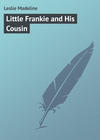Buch lesen: «Cora and The Doctor: or, Revelations of A Physician's Wife», Seite 15
With regard to myself, I feel at times a submission to the divine will, and even can realize the blessedness of my child in being with his Saviour, freed from sin and temptation to do evil; and then I am calm. But the merest trifle unnerves me. I have not had the heart to put away his clothes, and his little cap and cloak have hung in the hall as heretofore. A day or two since, I missed the cap from the hook, and going into the library I found my dear husband in an agony of grief over it. I was thankful that I was now able to be the comforter.
Thursday, June 7th.
I suppose ere this you have received the sad intelligence in my last, together with one of later date from Frank.
I have but just arrived at home from a journey to B – and some other places. I was exceedingly unwilling to leave my husband, whose duty detained him at home. But both on my own account and Pauline's, he thought it best to change the scene.
If it were not for the night, I could control my feelings; but I dream of my boy, and awake to find myself childless. Often he seems to stand by me or float before me in the air, and that dreadful, agonized "mamma" he uttered, rings in my ears, and awakes me in affright.
Of late, however, I have been less disturbed, and my dreams of him are delightful. Frank is unwilling to have me dwell so much upon my sorrow, and when I see him, though pale and suffering, going on quietly with his round of duties, I feel reproved.
I commenced writing of our journey. We went directly to B – after receiving a very kind invitation from uncle and aunt Morgan. Mother came over to the house to be with her son, and Emily accompanied me. Our journey was shorter than the former one, being all the way by railroad. We found our thoughtful cousin waiting for us at the station. The sight of his smiling face brought my little Walter so forcibly to mind, that I was completely overcome. Poor fellow! he was much distressed, and tried to soothe me. Pauline was delighted to see him, and put her hand in his, as confidingly as of old.
Uncle and aunt received us with parental tenderness. I was glad to hear from them so good an account of their son. He has gone into business in B – , and bids fair not only to be a wealthy, but a useful man. He went unknown to his parents and collected a Sabbath-school in the outskirts of the town, and in a place where the inhabitants had heretofore been regarded as too abandoned to be reclaimed. Here for a year past he has spent all the time he could command from other duties, during the week, as well as on the Sabbath, and now it is called the "Morgan parish."
Many who have known Joseph from babyhood, shook their heads when he commenced this labor of love; and thought, he only intended it for a new frolic, – that the novelty would soon pass away, and he would tire of the confinement. But as they see him more and more interested in his school, comprising now not only children, but parents, they feel a great respect for the young man.
I am quite amused at the way he treats Pauline, a little maiden of five years. He never plays with her, as it would be natural for him to do with a child of her age, but appears to regard her as something sacred; and is as delicate in his attentions as if she had numbered four times five years.
But cousin has not lost his character for fun. He would not be Joseph if he had; but he is very careful in his jokes not to wound the feelings of others. Then his manner of treating his parents is so much more respectful than formerly. Dear uncle and aunt! With what pride do they look upon his fine manly form and his bright happy face. Then they know this is a sure index of his heart. I found out his age while we were there, which was less than I had supposed. But I will keep his secret.
After a delightful visit at B – we returned by a somewhat circuitous route to visit other relatives, to whom I was not an entire stranger, having met them at mother's. Pauline was very much delighted with travelling, and Emily took pains to point out to her every object of interest.
I must not omit to mention a circumstance which occurred before we left B – . Joseph was reading various items from a New York paper while we sat around the breakfast table to which we all listened with interest, when he came upon the following. "We learn that the Honorable Mr. Karswell, and family, of the firm of C. M. Karswell and brothers, are about to leave by the packet ship Cambria for Liverpool, where he is to meet his son, who has been travelling for a number of years in company with a distinguished clergyman, formerly settled in Waverley, Massachusetts, when they intend to make the tour of Europe and to visit the Holy Land. Mr. Karswell considers himself very fortunate in having been able to avail himself of the company of Mr. Benson in their travels; he being familiar with the languages of the countries through which they pass; and every way a great acquisition."
I could not tell how Emily looked, for I took particular pains to be occupied with Pauline, but I am sure my own face burned.
"Well," said uncle, "pass on to the next," little aware what an interest that small item had to some of the hearers. Emily soon made an excuse to leave the room, and I thought it best not to revert to the subject. In the course of the day I looked over the paper to see if any part of this communication had been omitted in the reading; when to my astonishment it was nicely cut out.
Aunt looked up at my expression of surprise and said, "O! Emily asked if we had done with the paper, she wanted to cut out a pattern of something." I had my own thoughts, but of course said nothing, and so the subject passed. I may as well say here that on my return, I asked Frank what family Mr. Karswell had, and learned that there were two accomplished daughters. He has been a widower many years, and the eldest daughter has kept house for him. The younger one, Gertrude, Frank says, gave promise of great beauty.
Frank was a little troubled about the cutting out of that "pattern" from the paper, especially as Emily did it so secretly. "If she loves him yet," said he, "she has had a severe punishment for her proud dissimulation."
On our return from New York, and when we were within thirty miles of home, the cars were full, and Emily was separated from us by two seats, Pauline and I being together. A gentleman who was a stranger to me took the vacant seat by sister. He was very much browned, as if he had come from a foreign clime, but altogether a noble specimen of man. After a few moments I was astonished to see them in the full tide of conversation, Emily being more interested than I had seen her for many a day. The burden of the conversation at length devolved upon her, while he grew more and more taciturn, until I saw that he put his handkerchief to his eyes and was much overcome by what she said. As she turned a little toward her companion, I saw that her own eyes were humid with tears; and I wondered at the meaning of this emotion. Fortunately for my curiosity, we soon reached a station, and the persons sitting in front of us left. Emily and her companion immediately arose and availed themselves of this seat.
I was not a little surprised, as well as pleased, when Emily said to me, "Do you remember, Cora, I told you about Edward Ryland, brother to your little Anna's mother?"
"Yes, perfectly."
"Well, this is he, just returned from India. He has not heard from his sister for many years. I have been giving him a sketch of her history."
I cordially gave him my hand, which he grasped so warmly, that I did not recover from the pressure during the remainder of our ride. He begged for all the news, saying, "I am absolutely famished for intelligence from home friends." He was very much affected at hearing of the reformation and peaceful death of Squire Lee; and shocked though not much astonished at the conduct of Joseph. From his frequent inquiries concerning families in Waverley, I more than suspected there was some one in that place whom the thought of meeting thrilled his soul with the sentiment,
"My heart's so full of joy,
That I shall do some wild extravagance
Of love in public; and the foolish world,
Which knows not tenderness, will think me mad."
We were so much engaged in talking as to be unaware of our near approach to Crawford, and sprang hastily to our feet as the conductor called out the familiar name. Inviting Mr. Ryland to make us an early call, we took a carriage and drove home, where we had no reason to complain of our reception. I went into the house very gently, and pushing open the library door, I saw my own dear Frank sitting, reading with his back to the entrance. I crept softly across the room, and put my arms around his neck. He sprang to his feet letting his book fall, and caught me in his arms.
"My wife, mine own, I will never let you leave me again. If you go, I shall follow. I am good for nothing without you. —
"Thinkest thou
That I could live, and let thee go,
Who art my life itself? – no – no."
We then went to find mother and all the dear family. I had been dreading the return for fear my grief would overpower me; but I was graciously supported. Frank was very kind, and kept us busily talking. I believe Emily told every circumstance which had happened during our absence, (which I omitted I mean) except the one unimportant fact of her begging and saving as a choice article, an inch of waste paper.
Monday, September 10th.
Allen Mansfield and Lucy are very pleasantly settled near us. Mrs. Burns, and one of the chambermaids from Lee Hall form their establishment, together with a little stranger a week old, who has already received the name of Emily Lenox. Frank says, Lucy is exceedingly happy and grateful for the sweet treasure.
There is one event connected with this family, however, which has cast a gloom over the whole town, at least the sober part of it. The distillery, which was closed very soon after Squire Lee was taken sick, has been started again, and is now in full tide of operation under the energetic management of an agent procured by Joseph. He is absent and Lee Hall is closed. Report says, he has gone abroad in company with his inseparable companion, Mr. Colby. It is really saddening to think of a young man of good talents, as Mr. Colby appeared to be, so entirely led away and ruined by bad company. For many months before they went away, his office was closed, and he made no pretensions to business. He had his home entirely with Joseph, if home it could be called, where there was drinking and fighting both in the parlors and in the kitchen. Many times the man who professedly kept up the establishment, had to call in help to separate Mr. Colby and Joseph. When drunk, they tried to kill each other; but when sober, or partly so, were apparently the best of friends.
CHAPTER XXVI
"LOVE! – what a volume in a word, an ocean in a tear!" Tupper.
Wednesday, June 10th, 1840.
Dearest Mother, – It is a week since sister Nelly sailed for home. I am so lost without her, that I have determined to resume my journal which has been interrupted for nearly two years.
I can never sufficiently thank you for sparing her to me so long. I sent many messages by her which I could not find time to write. If you are as much interested in my friends as she was, she will give you the latest intelligence from them. She would not be contented until she had received an introduction in person. Many of them exceedingly regret her departure.
The family of Mrs. Reynolds, she liked much, though she could not see Anna, as she was adopted by her uncle Edward soon after his marriage, and lives in New York. My suspicions were very soon confirmed with regard to him, by an invitation to a wedding at his sister's, where I was introduced to a Miss Grant, who in a few moments became Mrs. Edward Ryland.
Miss Grant had waited patiently for her lover all these years; with a woman's true heart refusing to listen for a moment to other proposals of marriage. Even her own parents were not aware of the state of her affections, and had often urged her to give a reason for not wishing to settle in life. All the reason the poor girl could give, was that she did not love the suitor. But her faithfulness is now rewarded, and Mr. Ryland hastened with his bride to New York to become a partner in the firm for which he went to India.
Mrs. Reynolds was very unwilling to part with Anna, more especially on account of her husband's health, who would, she feared, miss the lovely child. At that time William was very feeble, and it was feared that his exposures in his wanderings from home in former years might bring on consumption. But for a year past he has enjoyed perfect health. I suppose, Nelly will tell you that a little miss has come to take Anna's place, and that she is called Cora Lenox Reynolds. I never liked the name better than when I have seen the little creature come shyly up to me, turning her head one side and the other, and looking out from under her curls to take something I had carried; and heard her lisp out her name, "Cowa Lenox." The Doctor makes a great pet of her, and is so much delighted with her name that it would be no wonder to me, if by and by there should be quite a regiment of Cora Lenoxes among his patients. In that case I should find it cheaper to import a quantity of silver cups than to purchase them here.
I have no doubt much as Nelly desired to see the dear home friends, that long ere this she has wished herself back for one more frolic with her little namesake. When I say to the darling, "Baby want to see Aunt Nelly?" she crows and screams with delight. We all think her very like sister; the same deep blue eyes, and fair complexion, so different from her beautiful brother who looked far more like a Lenox. I sometimes smile as strangers notice the striking resemblance of Pauline to her father. I used to fancy the same thing myself when she was a baby.
I long for the return of our dear friends Allen and Lucy, who took sister in charge as far as New York, and saw her safely on board ship. They enclosed me a short note from her, with her last farewell just before she sailed. Emily says, "it seems as if half Crawford were gone." We are all lonely without the lively girl.
Miss Nelly calls and I must obey. Frank says, I am not half as strict with her as I was with Pauline or Walter; and it may be true; I feel so uncertain of her life, since our sweet boy was taken away so suddenly.
Thursday, June 18th.
Allen and Lucy returned yesterday, and we all went in to spend the evening with them. Miss Emily Mansfield was allowed to sit up to welcome her mamma, and could not be persuaded to leave her for a moment. Sister is very proud of her little namesake.
We had been talking of sister Nelly and other topics in a lively manner, when Lucy suddenly started, saying, "Bye the bye, Emily, who do you think we saw on our way to Philadelphia?" and without waiting for a reply, "Mr. Benson, who used to be settled in Waverley. I thought at one time that he was a flame of yours; but he is married now; and to one of the most beautiful creatures I ever saw. She was leaning on his arm and looking up in his face with the most wife-like fondness."
Lucy talked so rapidly, and was so rejoiced to be the first to tell the news, that she did not appear to notice the effect it had on her hearers. If I had done anything, I should have burst out crying. I had woven so many pretty romances about his coming home faithful to sister, and all that, and finding out she did love him.
As no one spoke, Frank said with the utmost calmness, "he married Miss Karswell, I suppose, sister of the young man with whom he has been travelling."
"No, not sister," replied Lucy, "but a cousin, who accompanied his sisters. Our informant who knew the family well, told me that Charles was not altogether pleased, as he wished to marry his cousin himself. She is a Southerner; and they were on their way to the south. He is so much altered that I should hardly have known him, if it were not for his mouth and voice. I stood near them in the boat, and heard him say, he wished her parents were to meet them in Philadelphia instead of Charleston, for it would be extremely warm there at this season. She replied, 'it shall be my endeavor to make it so delightful to you, that you will forget the heat.'"
"Didn't you speak to them?" I asked, recovering my voice.
"Yes, but it was just as we were leaving. He seemed really annoyed that I had not made myself known at once. I told him I was not sure for some time whether it were really he."
"'Am I then so much altered?' said he sadly; but at the same time a beautiful smile played for one instant around his mouth, and vanished."
"Then you were not introduced to his lady?"
"No, though she kept tight hold of his arm, and seemed almost impatient that he stopped even that short space. Altogether he was the most distinguished gentleman on board the boat, always excepting my own husband," she added, with a merry glance at him.
When the conversation turned to another theme, I ventured to look at Emily. To my astonishment, she appeared to be wholly engrossed in a new book, she had taken from the table; but on looking a moment I perceived a deadly pallor about her mouth; and suddenly remembered that we were making a very long call upon persons just returned.
When we were at home, I merely ran to take a peep into the nursery, and finding all quiet, I begged Frank to excuse me for a few moments.
"Where is Emily?" I asked of mother.
"She went to her room to lay aside her bonnet."
I followed, and found the poor girl in the very abandonment of grief. She had tossed her bonnet into a chair, and was kneeling by the bed, with her arms thrown over her head, which was buried in the pillow.
I knelt by her side, putting my arms around her. "Dear sister," I said, "don't weep so. Do let me comfort you." But I stopped; what could I say?
After a few moments, she arose and sat by me. "Oh, Emily!" I said, "if you look so, you will break my heart."
"I believe," she replied in a mournful tone, putting her hand to her side, "that mine is broken. I thought I had schooled myself to hear this. I ought to have expected it; but oh! I have deceived myself."
I was never more embarrassed for words to express sympathy, and was awkwardly silent.
"Cora," said she, looking at me, "there is no human being but yourself whom I would allow to witness my" – she hesitated, "my grief at this intelligence. My poor mother would be so pained, if she knew her daughter loved another woman's husband." This last sentence was spoken in her old bitter tone, and carried me back to past years. "And it shall not be. To-morrow you will see me the same as ever. Please, dear sister," she added, in a softened tone, "never allude to my grief. It will soon be over."
It was only when she spoke of herself that her voice was harsh and severe. I looked with admiration at her as she drew up her form, and revealed the Lenox will, Frank sometimes refers to.
Mother looked very happy as her daughter came in smiling and talking of Lucy's improved appearance since her return. My face was by far the sadder of the two. I have never been able to conceal my feelings. "Dear mother," I thought as I bid her good night, "you would not sleep much if you knew what an aching heart lay beneath that smiling face."
Saturday, June 20th.
Cæsar carried me and my smaller treasures this afternoon to see Aunt Susy, who has been rather failing in health this summer. Pauline has been with me several times, and is always delighted to accompany me there. But now I was going to introduce my little Nelly, though not without some fears that the squeezing she would get, would frighten the timid little thing. Aunt Susy is no longer able to watch at the door to see who goes by; but her heart has not grown cold while sitting in her easy chair. I stepped into the entry and knocked at the inner door.
"Walk right in!" In obedience to this invitation, I opened the door, and with Nelly in my arms, went up to the old lady. She looked over her glasses for a moment as if she did not recognize me with my baby, and before she could say anything, I laid the little miss in her lap.
"Bless its little soul," said Aunt Susy, carefully laying aside her knitting where the needles couldn't hurt the child. "Well Miss Lenox, if that don't beat all. I never know'd you'd got another;" and to pay for being kept in ignorance, she began in good earnest to squeeze it to her large warm heart. The baby crowed with delight, and as oft as she had a kiss, would give a snatch for the glasses. All this time Pauline and her mother stood by unnoticed, while the dear child had her little red lips made up for a kiss.
"Here, Aunt Susy," I said, "give me the baby, this young lady is waiting her turn."
The good woman went into the business fundamentally, and now that she undertook with Pauline, she was in no haste to get through. When they stopped to take breath she looked in Pauline's face. "La! it beats all natur how she grows like her pa."
The dear soul had forgotten the fact which interested her so much years ago, and really supposed the child to be our own.
"There's – what do you call her?"
"Ellen," I answered.
"There's Ellen now, looks more like you, while Pauline is clear father. I'll venture he sets a sight by her."
Pauline laughed, though she didn't know exactly the meaning of the latter phrase.
"Blessed little soul," she resumed with another squeeze, "what made you think o' that?"
"Because," said Pauline, "you are so kind."
I looked inquiringly at the whisperer.
"La!" said Aunt Susy wiping her eyes, "the dear little cretur says she loves me, and I don't know what it's for, if 'taint that I loved your pa long enough afore you was born; and I used to hold him on my lap, and sing 'Ride a jack horse to Banbury cross,' and he'd laugh as hearty as the baby did just now."
At this very moment Mrs. Wilson returned from the garden, when her mother called out, "Darter, did you ever hear tell that Doctor Frank had had another baby?"
"Oh, yes, mother!" she answered, shaking hands with me, "and you knew it too at the time, but you've forgotten."
"Well, p'r'aps I did," she said with a sigh, "my memory's grown very poor; but I haven't forgotten where my Saviour is," she added, her countenance brightening, "nor he wont forget me; though sometimes I'm almost tempted to fear he don't altogether remember how long I've been expecting he'd send for me to go home. Every morning I ask him if it's God's will to take me before night; and every night I pray to go before the sun rises. But he knows best, and I try not to feel impatient o' waiting for him."
I cannot describe the holy expression of the dear old lady as she said this.
Thursday, June 25th.
How little I thought when I wrote the last sentence, that I should never more feel that warm embrace; never meet those eyes beaming with love. The dear blessed woman is now where she so longed and prayed to be. Her Saviour had not forgotten her, but came during the silent watches of the night and took her home.
So silently did she resign her spirit to her beloved Lord, that not even her daughter, whose room joins hers, and who heard her whispering her prayers and hymns after she retired, knew aught of the solemn visitor. But he was not unexpected, or unwelcome to the sleeper. She was so impatient to answer the summons, she could not stop to bid farewell to her earthly friends. Her Saviour called, and she hastened to obey.
In the morning Mrs. Wilson, after waiting beyond the usual time, stepped softly to the bed side of her mother. Struck dumb by the gloriously joyous expression, she went back to the sitting room and beckoned her husband to look before she awoke the sleeper, then leaning forward, said, "mother, mother!"
"Oh! wonder not, motherless daughter, that she is deaf to your call. Her ears are listening to notes of heavenly music which ravish her soul. Her eyes are feasting on her Saviour, and she is satisfied, now that she beholds his face in glory!"
I could not resist the wish to see that beautiful countenance once more before it was forever buried from sight; and my dear Frank went with me to the chamber of death. I felt very sad as we approached the house; but when I entered the room where I had always seen her, and looked beneath the linen cloth which covered her from view, I could not weep. I felt as if I had caught a glimpse of heaven.
"Surely," said I, "that wonderful smile is not of earth."
"Perhaps," said Frank, "it was the smile of welcome to the messenger who summoned her home. Death was a welcome guest to her."
As we gazed we could follow her rapt spirit to the mansions of the blessed, and behold her heart ever more expanding with love to her Saviour and her God.
"Thy face
Is all at once spread over with a calm
More beautiful than sleep, or mirth, or joy."
Wednesday, July 29th.
We have heard that there are great preparations making in Waverley for the welcome of their former pastor. It is now more than a year since Mr. Tyler left them for another field of labor; and when the parish heard that Mr. Benson had returned, they gave him a unanimous call to resettle with them. They have not received a regular answer to their call; but only that he will be with them, providence permitting, the second Sabbath in August. They seem to feel sure, however, that he will prefer to settle with the people of his first love. And they are ready to offer him a better support than they were able to do formerly. The young men are fitting up the grounds about the parsonage, and the whole village is alive with interest. I can't tell whether to be glad or sorry. Perhaps if Emily were to see him often, she would the sooner conquer any remaining interest she may feel for him.
Since that first night, if she is indulging grief, she deceives even me. Indeed, I told Frank to-day, after she left the room, that I considered her uncommonly cheerful. But he thought otherwise, and gravely shook his head.
Thursday, July 30th.
The parish committee in Waverley have received a communication from Mr. Benson, that he hopes to be with them on Thursday, the sixth day of August, and should be happy to meet any of his old people in the vestry or at any place they may appoint. No sooner did they hear this than they determined that it should be a feast of welcome. They are perfectly enthusiastic in their love for him. I only hope his wife may be a suitable help-meet.
Mr. and Mrs. Munroe called here to-day to invite us in behalf of the managing committee to be present on the occasion; I answered vaguely, "that if the Doctor were at liberty," etc., etc.
Friday, July 31st.
I am astonished at Emily – here she has been planning a journey to C – and has never let us know it until to-day. I went in this morning to give her and mother the invitation left by Mr. Munroe. She answered gayly, "I should be happy to go, but I shall be far away before that time."
"Where?" I asked in surprise.
"Oh, somewhere among the Catskill Mountains; but," she continued, "Ruth and I have made a nice loaf of cake. It is bride's cake," she added, laughing gayly, as she brought from the closet a large loaf beautifully frosted. I forgot to mention, that cake, fruits, and flowers had been solicited for the occasion.
"Cæsar," said Emily, "has promised me two bouquets made in his best style; and remember, Mr. Benson is to hold one and his wife the other." Then, with a low courtesy in acknowledgment of my profound amazement, she deposited the cake in the closet again.
"Emily," said I, as mother answered a summons from the room, "I do believe you're getting crazed."
"Why?"
"Because you laugh so much, and act so strangely."
"Well, dear sister," said she, growing very grave, "if crying will suit you any better, I can easily do that," and leaning her head upon the table, with her arms for her pillow, she gave way to a passionate burst of grief.
"And sorrow too finds some relief
In tears which wait upon our grief."
I stood in the middle of the room perfectly confounded, and was hesitating whether I ought not to run home for Frank, when hearing a distant door shut she started up, throwing her arms around my neck, and said hurriedly, "Dear sister, don't look so very sad. It has been a hard struggle; but it is almost over. I seldom give way as I have done now; that is too great a luxury to be indulged in often."
"At times e'en bitter tears yield sweet relief."
She turned to leave me; but I persisted in following her to her room. We sat down after I had closed the door. Turning from our late subject, she began to say something in a careless tone.
"Don't, Emily, don't speak so, that makes me feel worse than anything."
"Cora," she exclaimed in an excited tone, as unlike the other, as if she were a different person, "Cora, what do you think you should do, if after all the years you've loved Frank, you should suddenly find out some day, you were committing sin every moment you continued to love him? Supposing you should some day find out he had another wife?"
"Oh! sister," I answered, "I should die, I couldn't help loving Frank."
"No, that would be too easy; I'll tell you what you should do," drawing herself up to her full height, and looking almost like a queen. "You must tear up your love by the roots; you must never allow one tender thought of him. Drive them out. Drive them away! You must keep saying to yourself, 'It is sin against God! It is sin against my own soul!' Night and day you must do this."
"Dear, darling sister," said I, weeping upon her neck, "Is this the way you have to do?" I stood back and gazed at her with admiration. Never had she seemed more beautiful. Her whole countenance was brilliant with excitement; and she looked like one whose mind was made up to conquer or to die. But as I stood, she put her arm lovingly around me. "Dearest sister, I have done wrong to pain you thus; and for my own sake I must avoid such scenes. I must struggle and conquer alone. No, not alone," she added in a subdued voice, "my Saviour will aid me."




















